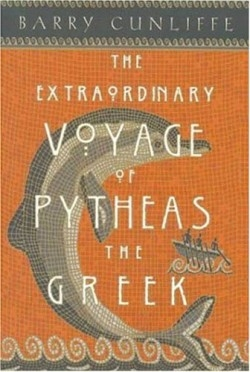
The Extraordinary Voyage of Pytheas the Greek
Ultima Thule—the end of the world, the last extremity. The phrase has resonated through history but has remained oddly problematic: just how is Thule pronounced; where is or was it; and what—if anything—was to be found on arrival there? In a far-ranging, always engaging investigation, the author, professor of archaeology at Oxford University, has put a great deal of what is known or conjectured about Ultima Thule on the table and argues powerfully for Iceland as the elusive land’s actual location.
Around 320 B.C., the worthy Pytheas sailed north from the Greek colony of Massalia (Marseille), up past Britain, and eventually reached ice-wrapped, mist-shrouded Thule. He wrote an account of his voyage, titled On The Ocean, “which,” writes Cunliffe, “to judge from the surviving fragments, was a general scientific work with sections devoted to astronomy, the ocean, and the geography of northwest Atlantic Europe.” The account was lost, but part of its content was quoted (sometimes dismissively) by ancient scholars, Herodotus, Strabo, Avienus, Pliny and, centuries later, the monks Dicuil and Bede, respectively ornaments of Irish and English learning.
Cunliffe approaches the questions of Pytheas’s motivation, knowledge base (theoretical and practical), vessel and resources, possible/probable route, reportorial accuracy and the transmission and impact of his account though a broad survey technique, extrapolating from hard knowledge of Greek colonization, trade patterns, archaeological findings, and the social and economic environment. He notes, “We now know a great deal about the places Pytheas claims to have visited—far more any of his contemporaries could possibly have known.” To this he adds a commentary on contemporary and later astronomical and navigational knowledge, noting for example that Hipparchus gives credit to Pytheas for valuable celestial observations.
Cunliffe’s approach yields a rich harvest that includes much of interest on topics as diverse as the mechanics of trade and exchange, the seldom-mentioned Egyptian explorations of Africa’s east and west coasts, the Cornish tin trade (noted by Julius Caesar among others), and Agricola’s circumnavigation of Britain. What Cunliffe captures best is the unrivalled spirit of enquiry that carried Pytheas beyond the Mediterranean, whether via the Pillars of Hercules or via the French rivers and seaways to the proverbially dangerous ocean and unknown lands beyond.
After digesting this rich, well-illustrated and well-referenced book, any energetic reader standing silent upon a skerry in Muckle Flugga, Shetland, will look north with a much-expanded imagination.
Disclosure: This article is not an endorsement, but a review. The publisher of this book provided free copies of the book to have their book reviewed by a professional reviewer. No fee was paid by the publisher for this review. Foreword Reviews only recommends books that we love. Foreword Magazine, Inc. is disclosing this in accordance with the Federal Trade Commission’s 16 CFR, Part 255.
